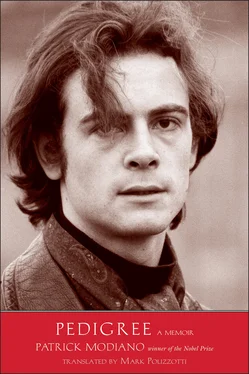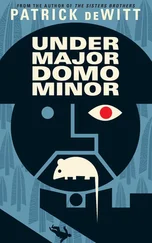That autumn of 1959, my mother was in a play at the Théâtre Fontaine. On the Saturday evenings when we could leave school, I sometimes did my homework in the theater director’s office. And I walked around. I discovered the Pigalle neighborhood, less rustic than Saint-Germain-des-Prés, somewhat rougher than the Champs-Elysées. It was there, on Rue Fontaine, Place Blanche, Rue Frochot, that I first brushed against the mysteries of Paris and, without realizing it, began dreaming of a life for myself.
On the Quai de Conti, two newcomers were living in the apartment: Robert Fly, an old friend of my father’s, who served as his chauffeur and took him everywhere in a Citroën DS 19, and Robert Car, a costume designer my mother had gotten to know on the set of Max Pécas’s film Le Cercle vicieux , in which she played the part of a rich and disturbing foreigner, the mistress of a young painter.
In January 1960, I ran away from school because I was infatuated with a certain Kiki Daragane, whom I’d met at my mother’s. After walking to the hangars of the Villacoublay airfield, then reaching Saint-Germain-des-Prés by bus and metro, I happened to run into Kiki Daragane at the café Malafosse, where Rue Bonaparte meets the quay. She was with some art student friends. They advised me to go back home. I rang at my door, but there was no answer. My father must have been out with Robert Fly in the DS 19. My mother was away, as usual. I needed a place to sleep. I went back to the boarding school by metro and bus, after begging a little money off Kiki and her friends. The principal agreed to keep me until June. But at the end of the school year, I was to be expelled.
On my rare days out, my father and Robert Fly would sometimes take me along on their perambulations. They crisscrossed the Ile-de-France. They met with notaries and visited an array of properties. They stopped at rustic inns. Apparently my father, for some pressing reason, wanted to “get out of town.” In Paris, long confabulations between Robert Fly and my father, at the back of the office at 73 Boulevard Haussmann, where I would join them. Robert Fly sported a blond mustache. Apart from driving the DS 19, I have no idea what he did. Now and then, he told me, he took a “side trip” to Pigalle, and he would return home to the Quai de Conti at seven in the morning. Robert Car turned a bedroom of the apartment into a dressmaking studio. My father nicknamed him Truffaldino, after a character in the commedia dell’arte. In the 1940s, it had been Robert Car who dressed the first transvestites: La Zambella, Lucky Sarcel, Zizi Moustic.
I accompanied my father to Rue Christophe-Colomb, where he visited a new “crony,” a certain Morawski, in a small private hotel at number 12 or 14. I would wait for him, pacing back and forth under the leaves of the chestnut trees. It was early spring. My mother was in a play at the Théâtre des Arts, directed by a Mme Alexandra Roubé-Jansky. The play was called Women Want to Know. It was by a silk manufacturer from Lyon and his girlfriend and they’d underwritten the entire production, renting out the theater and paying the actors out of pocket. Every evening they played to an empty hall. The only spectators were a few friends of the silk manufacturer’s. The director wisely counseled the manufacturer not to invite the critics, on the pretext that they were “mean” …
On the last Sunday evening before summer holidays, Robert Fly and my father drove me to the Montcel school in the DS 19 and waited while I packed my suitcase. After stashing it in the trunk of the DS, I left Jouy-en-Josas for good via the westbound highway.
Apparently, they wanted to keep me away from Paris. In September 1960, I was enrolled in the Saint-Joseph de Thônes secondary school, in the mountains of the Haute-Savoie. A man called Jacques Gérin and his wife, Stella, my father’s sister, were my unofficial guardians. They lived in a rented white house with green shutters in Veyrier, on the edge of Lake Annecy. But apart from the rare Sundays when I was let out of school for a few hours, there wasn’t much they could do for me.
“Jacky” Gérin dabbled “in textiles.” He was originally from Lyon, a bohemian, fond of classical music, skiing, and expensive cars. Stella Gérin carried on a correspondence with the Geneva lawyer Pierre Jaccoud, who had been convicted of murder and was then serving time. When Jaccoud was released, she went to see him in Geneva. I later met him with her, at the bar of the Mövenpick, around 1963. He spoke to me of literature, particularly Mallarmé.
In Paris, Jacky Gérin served as front man for Uncle Ralph, my father’s younger brother: the so-called Etablissements Gérin, 74 Rue d’Hauteville, was in fact run by Uncle Ralph. I was never able to clarify the exact nature of that Etablissements Gérin, a sort of warehouse where Uncle Ralph had an office and sold “equipment.” Several years later, I asked him why the business was named Gérin and not Modiano, after him. He answered in his Paris accent: “Gotta understand, kid, Italian-sounding names didn’t really cut it after the war …”
On my last holiday afternoons, I read The Devil in the Flesh and Witches’ Sabbath on the small beach at Veyrier-du-Lac. A few days before classes started, my father sent me a harsh letter, the type of letter that could easily dishearten a boy about to be locked away in boarding school. Was he trying to assuage his conscience by convincing himself he was rightly abandoning a delinquent to his fate? “ALBERT RODOLPHE MODIANO 15 QUAI DE CONTI Paris VI, September 8, 1960. I’m returning the letter you sent me from Saint-Lô. I must tell you that, reading it, I did not believe for one second that your desire to return to Paris had anything to do with studying for entrance exams. That is why I decided you should leave the following morning, on the 9 o’clock train to Annecy. I expect a report about your conduct at this new school and I can only hope for your sake that it is exemplary. I had intended to come visit you in Geneva. Under the circumstances, this trip now seems pointless. ALBERT MODIANO.”
My mother blew through Annecy, just long enough to buy me two items for my school outfit: a gray smock and a used pair of shoes with crepe soles that would last me a good ten years and never leak. She left well before evening. It is always painful to see a child return to boarding school, knowing he’ll be a prisoner there. One would like to hold him back. Did that cross her mind? It seems I found no favor in her eyes. And besides, she was about to leave on a long trip to Spain.
Still September. New school year, Sunday evening. The first days at the Collège Saint-Joseph were hard for me. But I quickly got used to it. I had already spent four years in boarding schools. My schoolmates in Thônes were mainly of peasant origin, and I preferred them to the gilt-edged hooligans of Montcel.
Unfortunately, our reading was monitored. In 1962, I would be suspended for a few days for reading Ripening Seed by Colette. Thanks to my French teacher, Father Accambray, I would be granted “special” permission to read Madame Bovary , which was forbidden to the others. I’ve kept the copy of the book in which they wrote, “Approved — Junior year,” with the signature of Father Janin, the school principal. Father Accambray recommended one of Mauriac’s novels to me, The Unknown Sea , which I greatly enjoyed, especially the ending — so much so that I still remember the final phrase: “… as in the black dawns of yesteryear.” He also suggested Les Déracinés by Barrès. Had he sensed that what I was missing was a village in Sologne or the Valois, or rather, my dream version of them? My bedside books in the dormitory: Pavese’s This Business of Living , which they hadn’t thought to ban. Manon Lescaut. Les Filles du feu. Wuthering Heights. Diary of a Country Priest.
Читать дальше












